
Contents
- 1 What Are Virtual Learning Platforms?
- 2 Things to Consider Before Choosing the Best Virtual Learning Platforms
- 3 Key Features of Top Virtual Learning Platforms in India
- 4 Top 10 Virtual Learning Platforms in India
- 5 Benefits of Virtual Learning Platforms in India
- 6 Challenges and Mitigation Strategies
- 7 Future of Virtual Learning Platforms in India
- 8 Conclusion
What Are Virtual Learning Platforms?
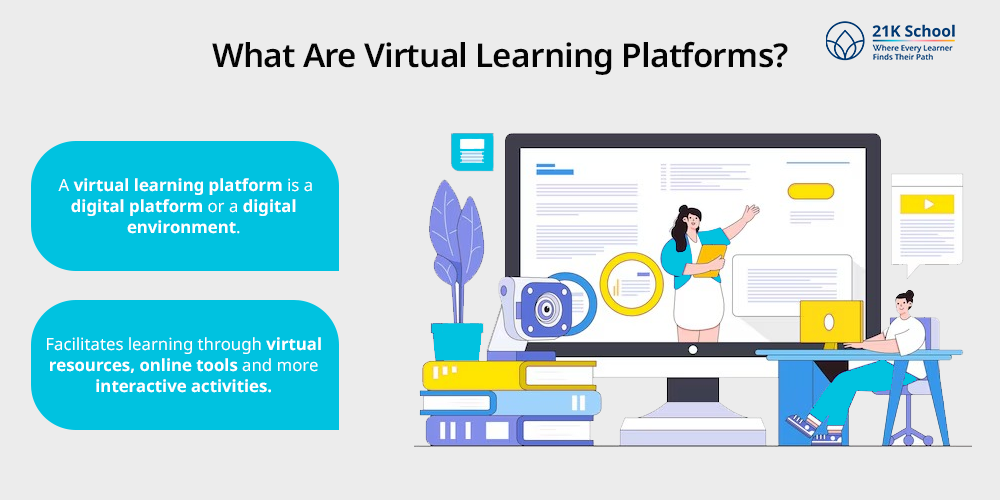
How many virtual platforms are there?
Before we get into this, what is a virtual learning platform?
A virtual learning platform is a digital platform or a digital environment, that facilitates learning through virtual resources, online tools and more interactive activities — virtual learning platforms have some recommendable impact on the education system.
These platforms are designed to teach and make education accessible to people across the globe — they are designed to make education accessible, flexible and engaging for all age groups and everyone involved; students, teachers and even professionals involved in the same.
These technological platforms facilitate learning, seamlessly and innovatively offering a perfect blend of experiential learning that is both advanced and personalised, the activities involved are — live classes, recorded sessions and assessments.
Things to Consider Before Choosing the Best Virtual Learning Platforms
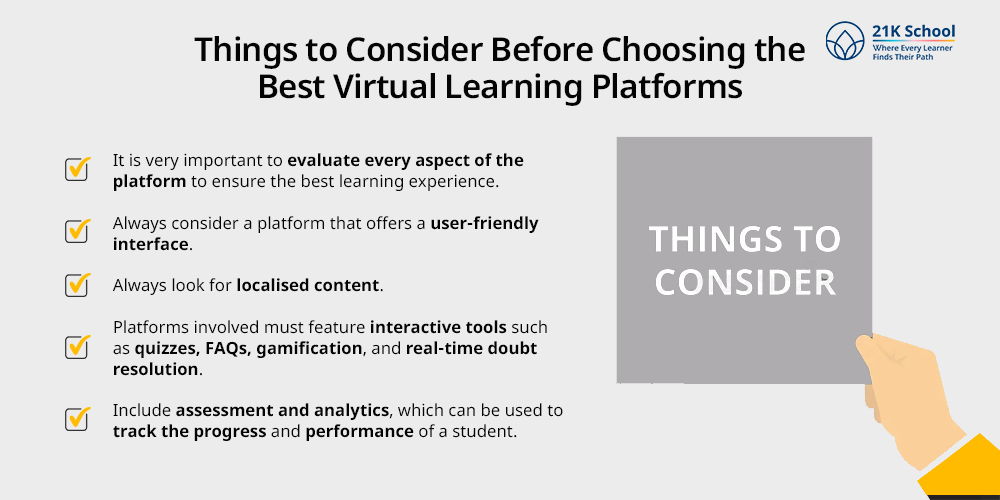
When choosing the best virtual platforms, it is very important to evaluate every aspect of the platform to ensure the best learning experience.
These specific factors are essential in the learning journey to determine a student’s future.
Always consider a platform that offers a user-friendly interface, that makes learning easy for people across all age groups; the interface determines navigation and platform compatibility with students making learning straightforward and interesting for all.
Now that the interface is determined and well-suited for all age groups, always look for localised content.
It is a crucial part of the learning journey, particularly in a country like India, where diversity is the core element of its existence. Students benefit significantly from courses offered in regional or native languages.
Platforms involved must feature interactive tools such as quizzes, FAQs, gamification, and real-time doubt resolution to enhance student engagement and knowledge retention.
Over and above everything it is important to include assessment and analytics, which can be used to track the progress and performance of a student in the academic journey.
Introduce mobile apps for the learning model, this introduces flexibility in learning promoting the model of learning on the go, this ensures access to quality education to all students, without barriers.
Key Features of Top Virtual Learning Platforms in India
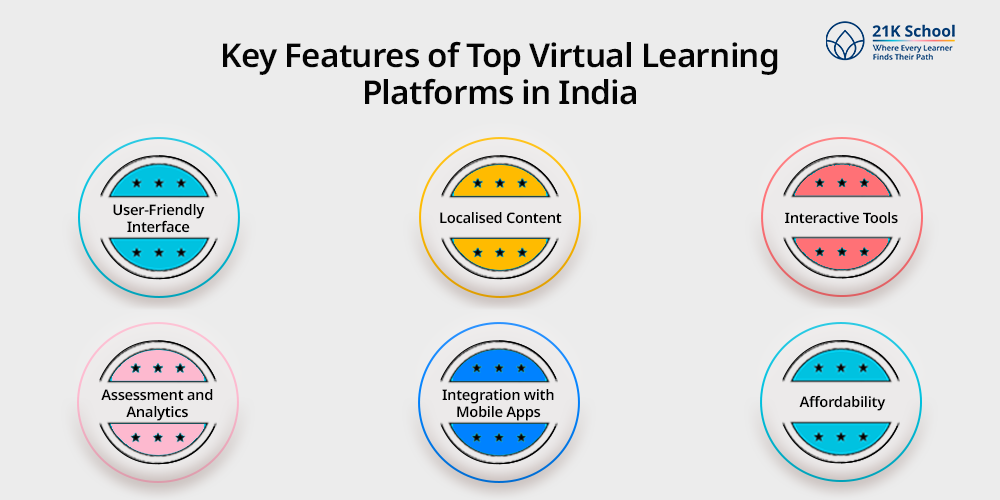
1. User-Friendly Interface
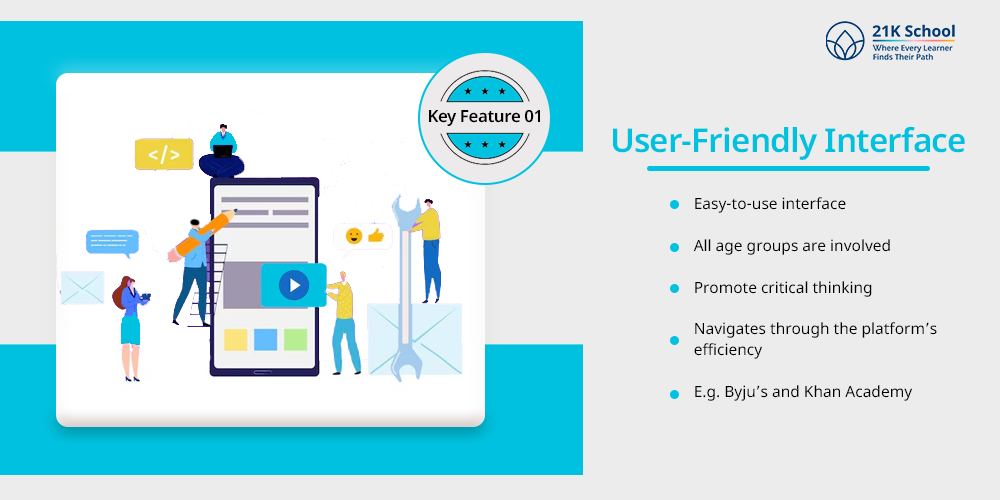
- Smooth, easy-to-use interface
- Ensures all age groups are involved
- Designed to promote critical thinking
- Navigates through the platform’s efficiency
- E.g. Byju’s and Khan Academy (offers simplicity and clarity for users)
2. Localised Content
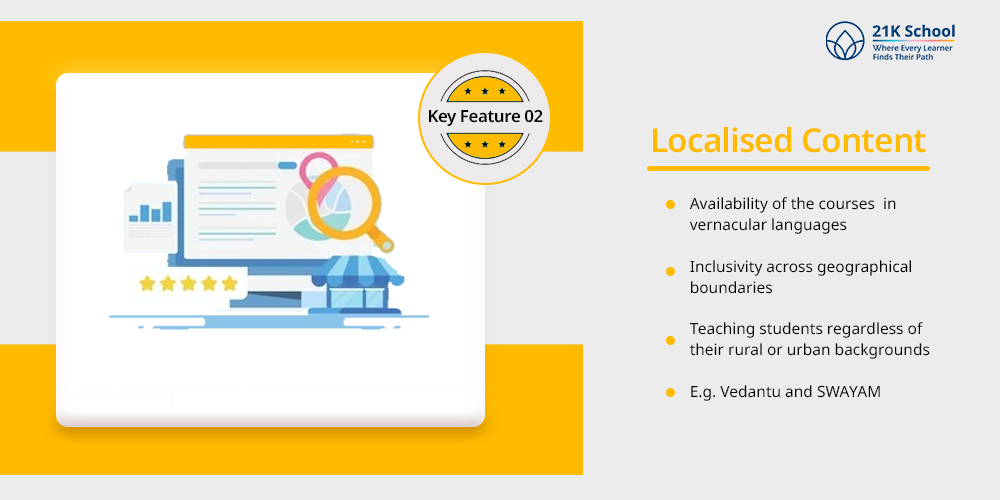
- Availability of the courses in vernacular languages
- Ensuring inclusivity across geographical boundaries
- Teaching students regardless of their rural or urban backgrounds
- A more effective approach to learning
- E.g. Vedantu and SWAYAM (These platforms cater to multilingual students)
3. Interactive Tools
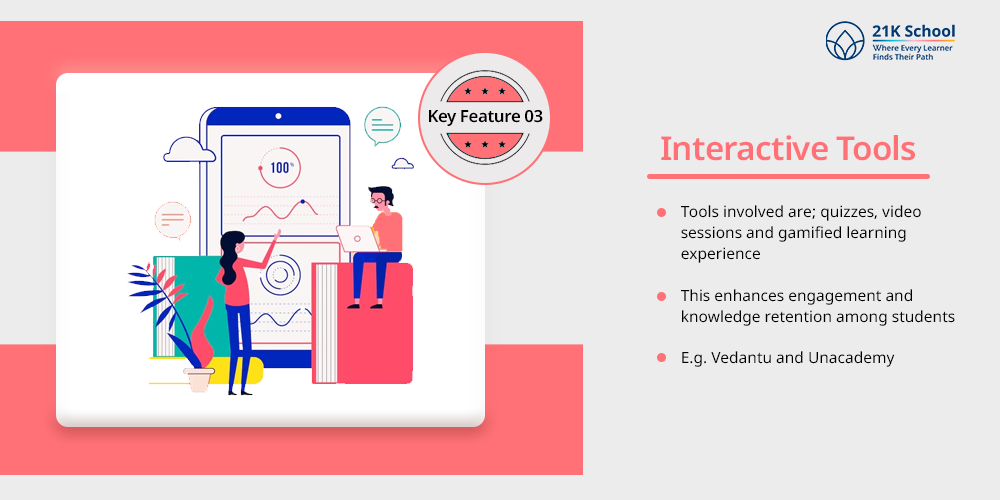
- Tools involved are; quizzes, video sessions and gamified learning experience
- This enhances engagement and knowledge retention among students
- E.g. Vedantu and Unacademy (offer a wide range of courses with live interaction and real-life doubt-solving tools)
4. Assessment and Analytics
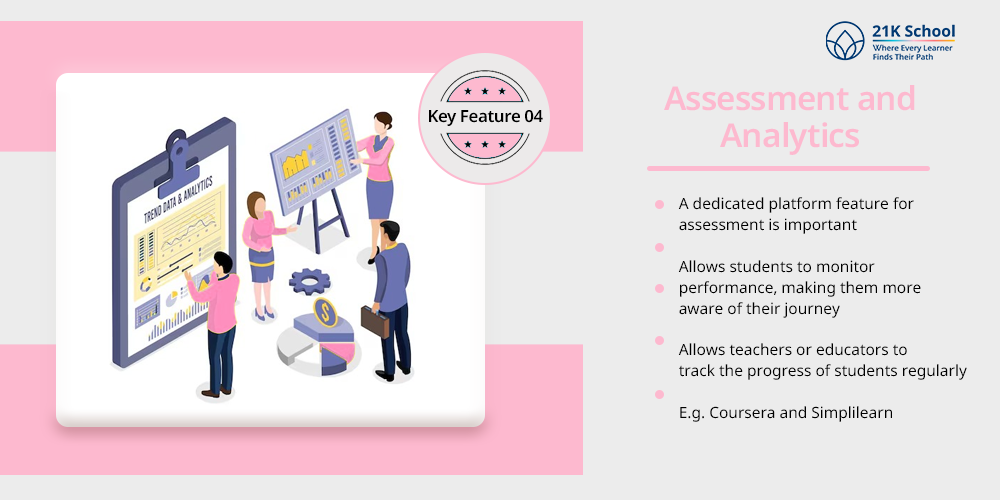
- A dedicated platform feature for assessment is important
- Allows students to monitor performance, making them more aware of their journey
- Also allows teachers or educators to track the progress of students regularly.
- E.g. Coursera and Simplilearn (offers in-depth analysis and promote skill-based programs or courses)
5. Integration with Mobile Apps
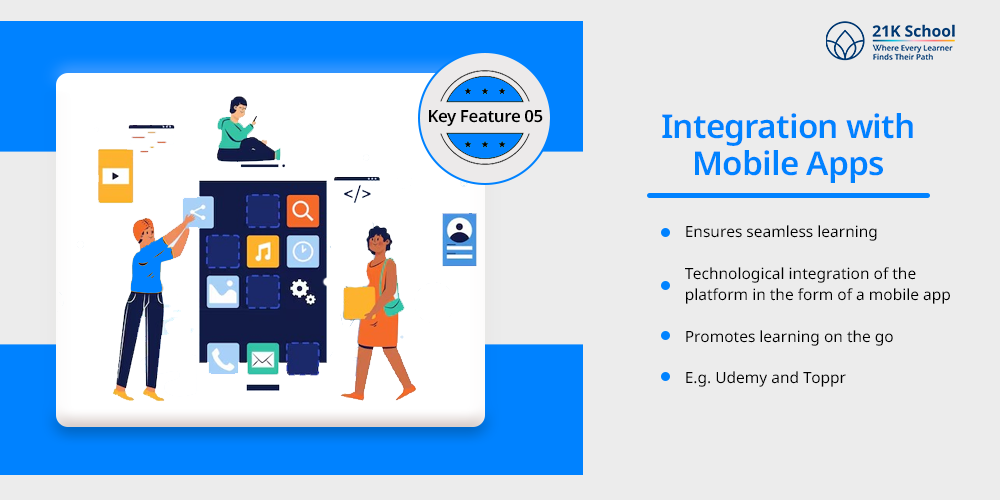
- This ensures seamless learning
- Technological integration of the platform in the form of a mobile app
- Promotes learning on the go (making it accessible and convenient from anywhere; anytime)
- E.g. Udemy and Toppr
6. Affordability
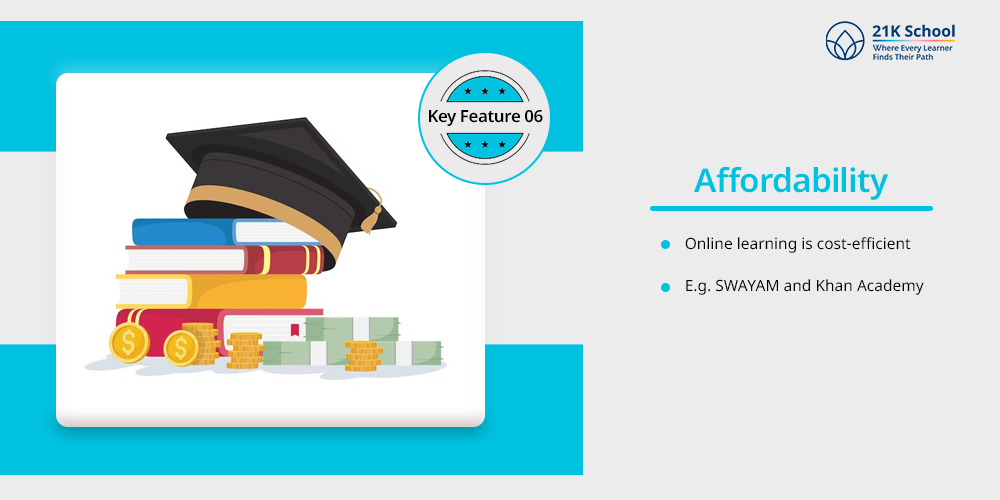
- Online learning is cost-efficient
- E.g. SWAYAM and Khan Academy (offers free and low-cost resource across the country)
Top 10 Virtual Learning Platforms in India
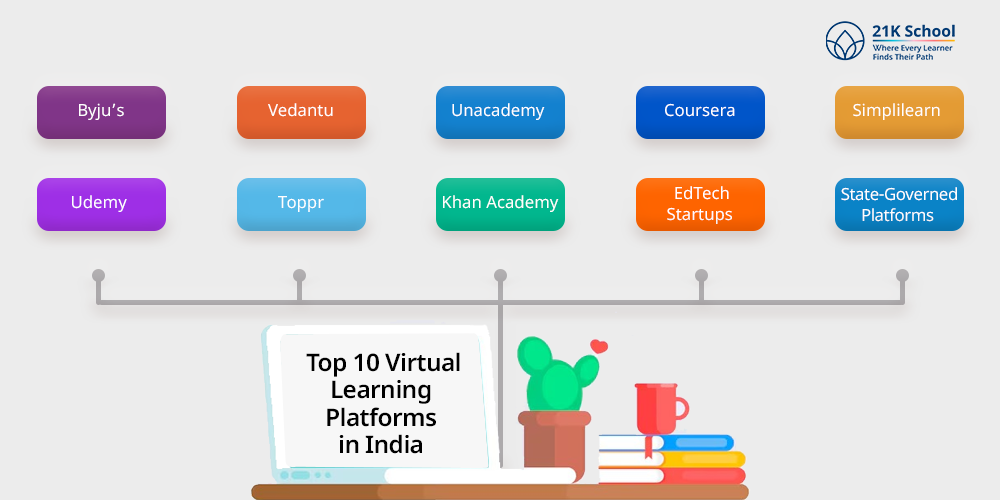
1. Byju’s
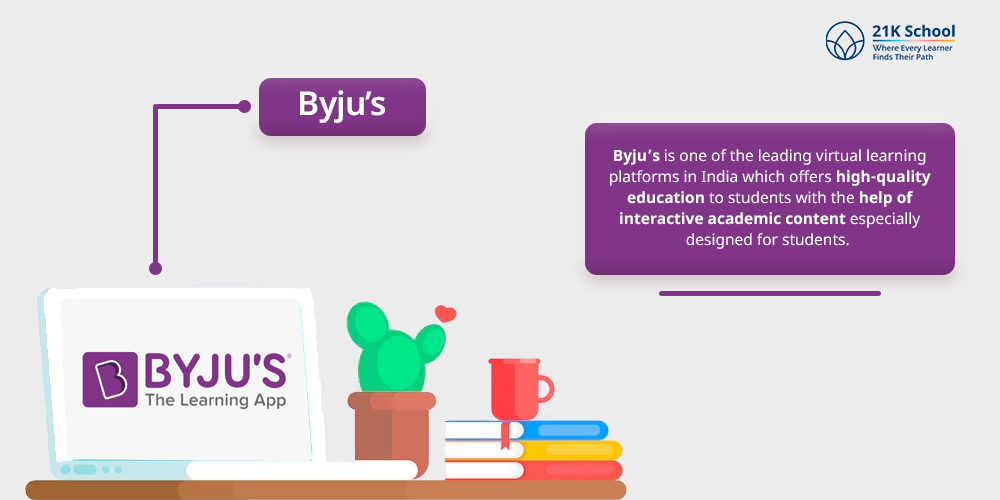
Byju’s is one of the leading virtual learning platforms in India which offers high-quality education to students with the help of interactive academic content especially designed for students.
These interactive contents like: engaging videos, animations, presentations and well-structured lessons help Byju’s simplify the learning process and make complex concepts easier to understand — this makes learning both interactive and effective.
Pros:
- The platform offers engaging and interactive content for students to improve knowledge retention and make learning fun for them. It is a great way to incorporate fun into learning.
- The animation-based visual content simplifies the complicated concepts for students from the textbook making it easier for them to understand and grasp.
- Byju’s is a platform which is well structured in terms of curriculum so it aligns well with the educational standards of India.
- Byju’s is one of the most compatible online platforms available in India ensuring that the students receive content based on every concept with clarity.
- The platform has a better focus on learning and provides a deeper understanding of the subject with the support of educators across India.
Cons:
- Byju’s is subscription-based and is costlier than other platforms which makes it unaffordable for some families.
- Being a completely visual and online content-based platform, reliance on visuals reduces traditional problem-solving skills in students by giving them easy access to solutions.
- Because of the online model, there is a lack of personalised live interaction in students and ultimately does not cater to the immediate guidance support required by a student in the learning process.
2. Vedantu
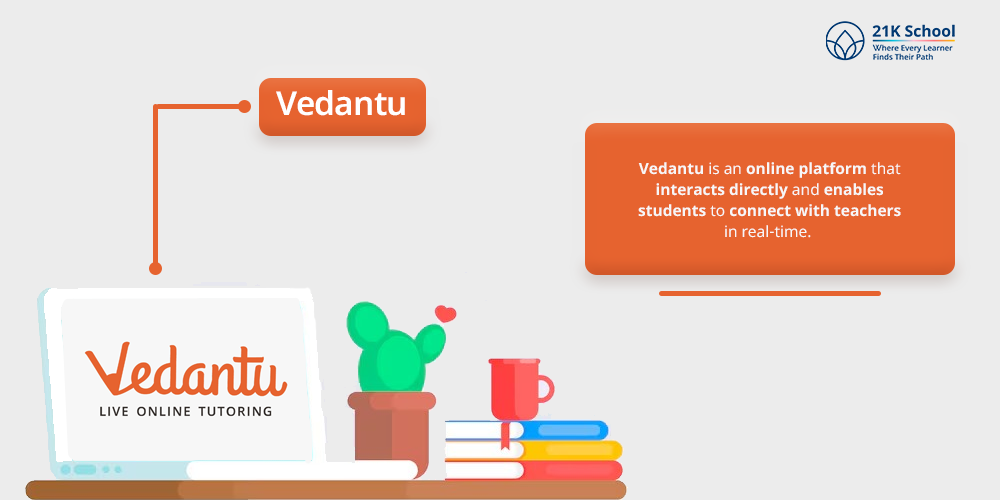
Vedantu is an online platform that interacts directly and enables students to connect with teachers in real-time. This form of online classes is best for doubt clearance.
The platform is beneficial for exam preparation and has a personalised learning approach that matches individual speed and needs and even those strengths and weaknesses.
Pros:
- Vedantu is a platform that offers real-time interaction with teachers and ensures that the students receive immediate router resolution for learning.
- The platform provides live classes which act like a classroom experience from the comfort of home.
- The personalised learning plan of the platform meets every individual’s learning speed and needs making sure no student is left behind and everybody feels included.
- On the platform, the teacher focuses on exam preparation strategies and helps in improving students’ outcomes which in traditional set up means result.
- The flexibility in the platform for scheduling classes makes it convenient for students to take time for their studies and their personal life and maintain the timetables effectively.
Cons:
- The platform offers live sessions that require a stable Internet connection at all times which is not always accessible for students and might have technical glitches hindering the learning process.
- Personalised plans on the platform are expensive for families who are tight on budget.
3. Unacademy
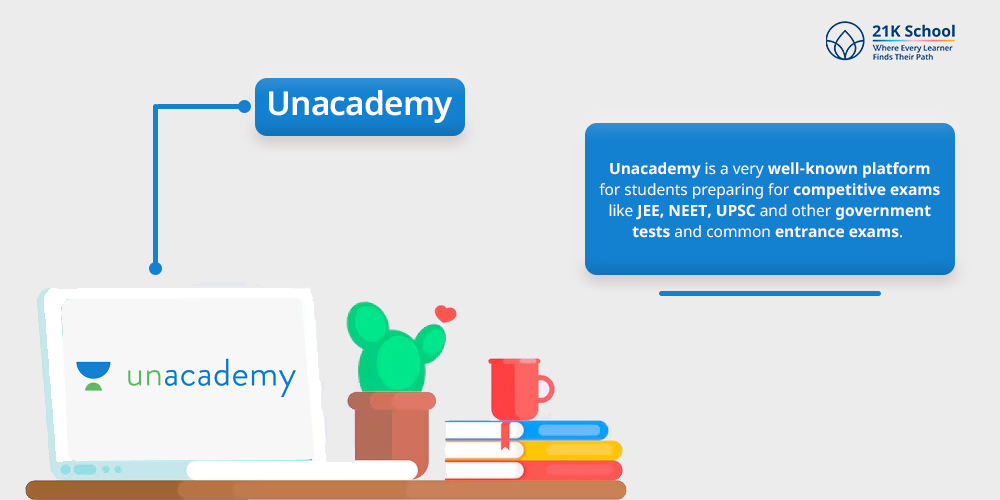
Unacademy is a very well-known platform for students preparing for competitive exams like JEE, NEET, UPSC and other government tests and common entrance exams.
The platform is well-structured and has a vast content library with experienced educators who guide students.
Unacademy also provides detailed guidance and focuses on creating a preparation-oriented environment for aspirants, with each course tailored to a specific competitive exam.
Pros:
- Unacademy offers a wide range of courses tailored to various competitive exams.
- The platform offers experienced educators who provide structured learning and expert guidance to their students.
- Access to live and recorded classes on the platform gives it a feature of flexible learning that is very helpful for students.
- The platform also offers affordable subscription plans as compared to traditional coaching centres which makes it very cost-efficient.
- The platform is also designed to offer regular mock tests and performance analysis which help students in analysing and tracking their progress.
Cons:
- The platform primarily focuses on competitive exams which are not well suited for all kinds of learners.
- To use the platform and prepare online for a competitive exam, a significant amount of self-discipline is required to follow the schedule and courses effectively.
- However, the platform offers limited engagement for students who prefer more interactive and hands-on learning tools.
4. Coursera
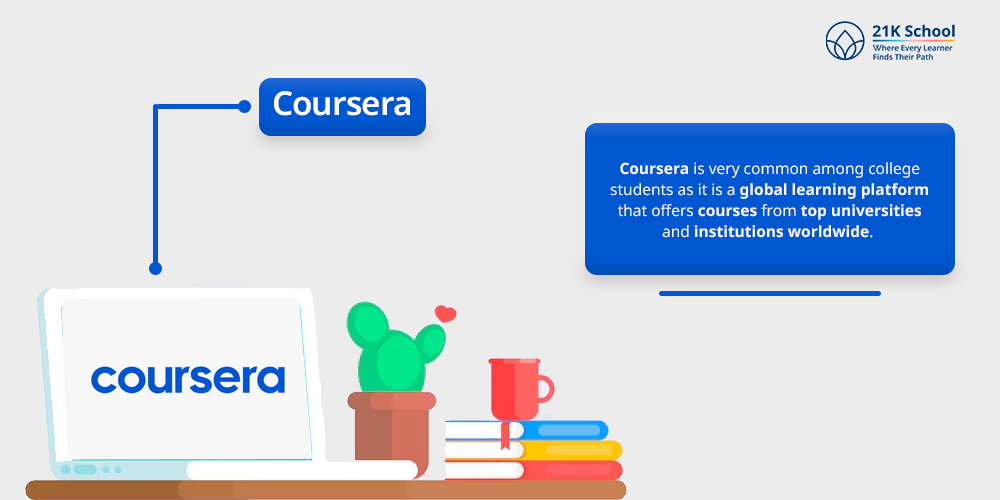
Coursera is very common among college students as it is a global learning platform that offers courses from top universities and institutions worldwide.
The platform is a certification-based skill-learning platform best suited for students and professionals seeking advancements in their careers.
The courses range from subject matter to even localized courses. It is a platform that facilitates self-paced learning.
Pros:
- Coursera gives access to courses from renowned world universities and educators.
- It also offers professional certifications that enhance career opportunities for students and professionals looking for better opportunities.
- The platform offers localised support and courses that make it accessible for diverse learners and make it more inclusive and convenient for people across all demographics.
- Coursera has a wide range of subjects which cater to students and working professionals helping them both at the same time.
- The platform promotes self-face learning options which provide flexibility to complete courses at any time from anywhere.
Cons:
- Some of the courses on the platform are expensive, especially those from the Student section which provides certification.
- It requires self-motivation to complete long-term courses that strictly adhere to the program’s structure and give assessment tests offered at the end of the course.
- The large variety of options available on the platform sometimes overwhelms new users.
5. Simplilearn
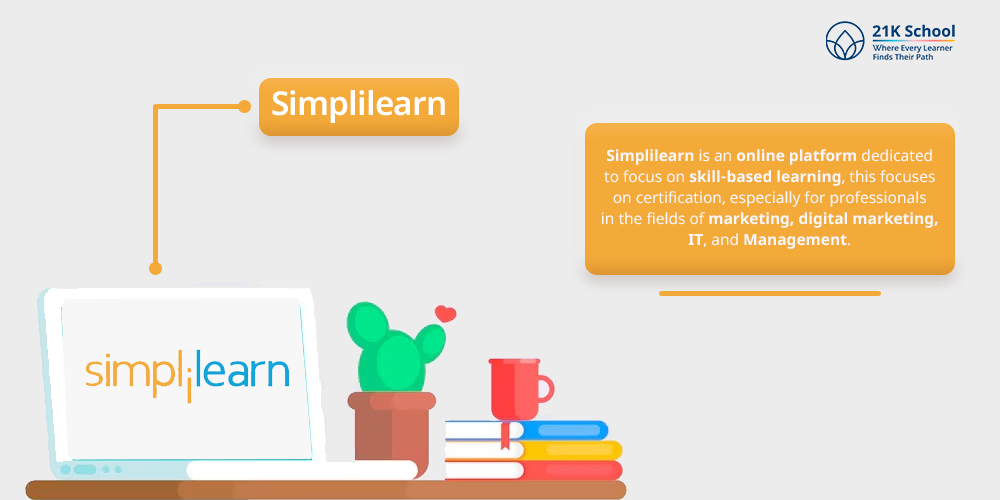
Simplilearn is an online platform dedicated to focus on skill-based learning, this focuses on certification, especially for professionals in the fields of marketing, digital marketing, IT, and Management.
It is designed for structured courses that help learners advance their careers stay updated with market trends and stay relevant in the competitive job market.
Pros:
- Simplilearn is a platform that focuses on career-oriented learning and skill-based learning specially designed for professionals.
- It is a certificate-based platform where the certificate offered is recognised globally and valued by employers.
- The platform offers tailored courses for industries like IT, digital marketing, finance and management.
- It provides practical projects that help learners gain real-world experience and the opportunity to work on a real project.
Cons:
- The courses offered by the platform are more expensive compared to other online platforms.
- The platform places a strong emphasis on theoretical knowledge, but it offers limited opportunities for the practical application of that knowledge.
- It requires a significant time commitment from professionals, making it challenging for them to strike a balance between their work life and the certification course.
6. Udemy
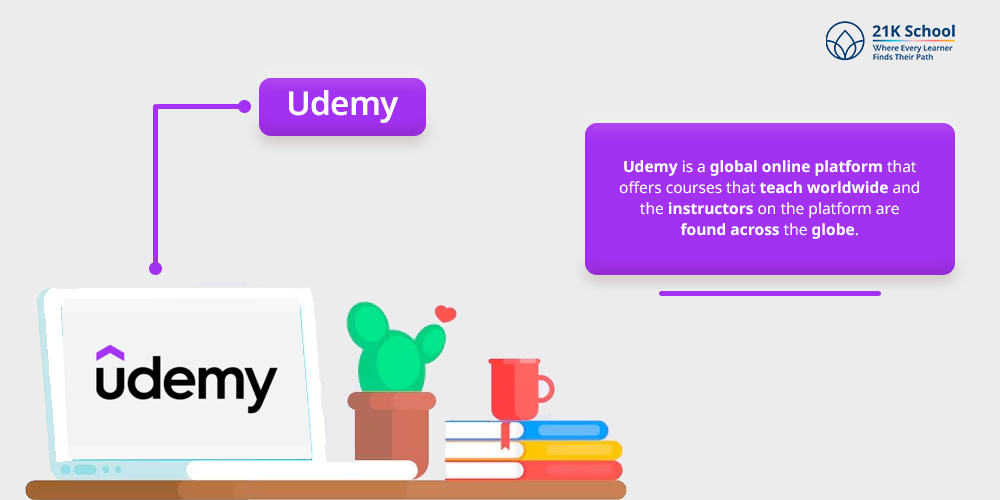
Udemy is a global online platform that offers courses that teach worldwide and the instructors on the platform are found across the globe.
The platform offers a wide range of content that is to be taught by professional and industry experts.
Some of the topics are technical while others may range up to personal and skill development. Allowing users to learn and upskill their work whenever and wherever they want.
Pros:
- Udemy offers a massive course library for learners covering both technical and non-technical topics.
- As compared to the resources available on the platform the pricing is very affordable and the platform also offers regular discounts and deals which makes it very cost-efficient and accessible for people across all demographics.
- It allows users to learn at their own pace and where they can create their schedule based on the progress, it makes their learning journey more convenient.
- The courses offered by the platform cater to all skill levels from beginners to advanced as per the learner’s creativity and capability.
- This certificate available on the platform enhances resume and career opportunities for people looking to switch jobs or find job opportunities
Cons:
- The course quality may vary as it follows in the open marketplace model which makes it complex to segregate between the quality product in the quantity.
- There is very limited interaction with instructors on the platform for most of the courses.
- There is no standardised curriculum that the platform follows which may affect the consistency in the learning for students seeking personal and skill development.
7. Toppr
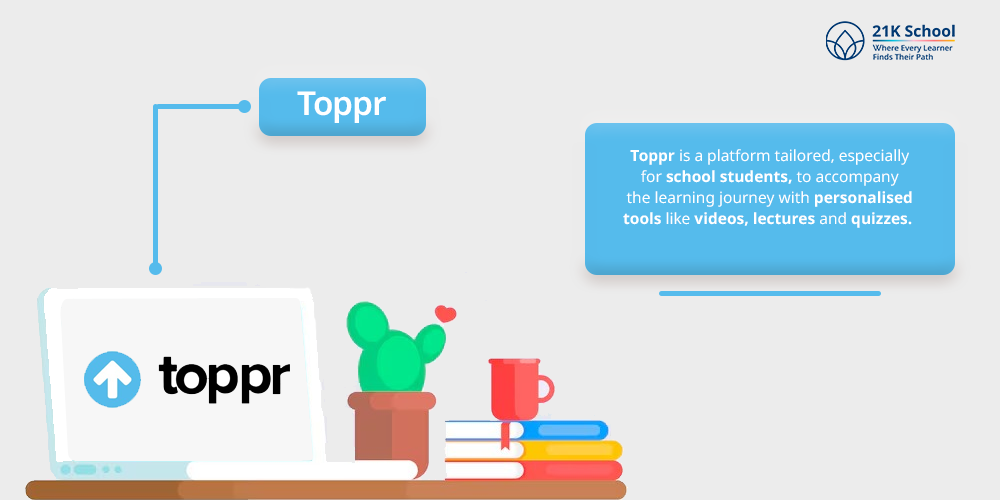
Toppr is a platform tailored, especially for school students, to accompany the learning journey with personalised tools like videos, lectures and quizzes.
The platform is ideal for students who are preparing for their board exams.
This learning platform offers adaptive learning tools for better understanding and improved knowledge retention staying focused on the foundation of blocks of school curriculum.
Pros:
- The platform offers a personalised learning path for every student ensuring that their needs and requirements are met thoroughly.
- It is a platform with adaptive learning tools which improve understanding and knowledge retention in students for every topic discussed.
- The platform is designed in a comprehensive manner that supports content for board examinations and higher education preparations.
- The platform offers engaging videos and causes which makes learning more interactive and enjoyable for students.
- The platform has a strong focus on the foundational concepts of the school curriculum ensuring that it meets the standard of Indian education.
Cons:
- The platform may not have sufficient real-time teacher interaction making it difficult for students to doubt clearance.
- The subscription-based model of the platform makes it unaffordable for some families.
- The platform provides limited coverage to extracurricular and non-academic subjects.
8. Khan Academy
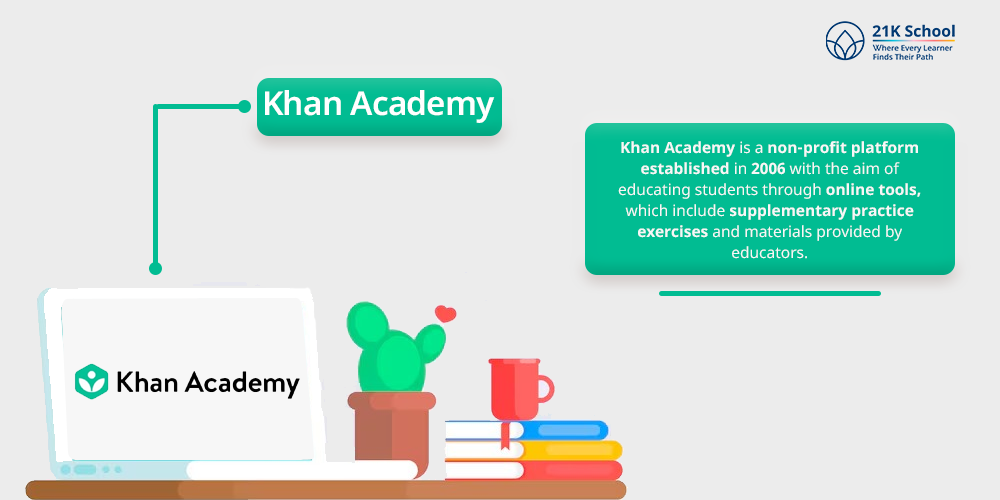
Khan Academy is a non-profit platform established in 2006 with the aim of educating students through online tools, which include supplementary practice exercises and materials provided by educators.
The platform offers free resources, videos and assessments from teachers across the globe.
Its mission is to make quality education accessible for every student who desires to learn regardless of their geographical and demographic background.
Pros:
- The platform is completely free ensuring that the education they provide is accessible to all students regardless of their economic background.
- The Khan Academy platform ensures high-quality videos and resources for a wide range of subjects.
- The platform supports both students and teachers in terms of education and personalised learning by providing them with all the necessary tools.
- The platform covers key subjects like maths, science, history, and general knowledge in depth, making sure that the core concept of students is clear.
- The platform is ideal for competitive exam preparations and general academic support and is not specialised for any curriculum.
Cons:
- The platform offers limited real-time interaction or doubt resolution support which makes it monotonous for students learning.
- The platform is primarily focused on theoretical knowledge giving fewer practical applications and making it very boring and text-oriented.
- To be on the platform and learn, a lot of self-discipline and time management are required, especially when preparing for a competitive exam without direct guidance in an online model.
9. EdTech Startups
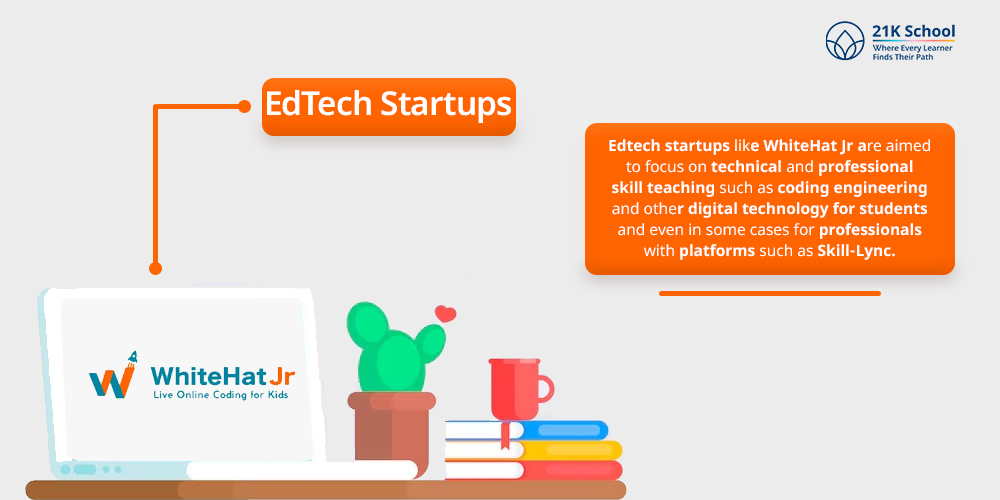
Edtech startups like WhiteHat Jr are aimed to focus on technical and professional skill teaching such as coding engineering and other digital technology for students and even in some cases for professionals with platforms such as Skill-Lync.
These platforms help students develop skills like storytelling and teach them the essence of lifelong learning.
Pros:
- Ed-tech startup platforms like WhiteHat Jr. specialise in future-ready skills such as coding, engineering, and technology.
- The platforms are highly practical and project-based as they provide learning from real-world applications making it more interesting and fun.
- It provides excellent preparation for the competitive job market and focuses on interactive learning with one-on-one mentorship for students and professionals.
- The platform caters to students of all ages from school students to working professionals making sure they help in skill building and contribute to lifelong learning.
Cons:
- The platform offers courses that are expensive compared to the budget of the average household.
- The platform has very limited or no focus on non-technical subjects or broader skill sets.
- There is a very significant amount of emphasis on coding and other technical aspects living out and neglecting holistic learning in students.
10. State-Governed Platforms
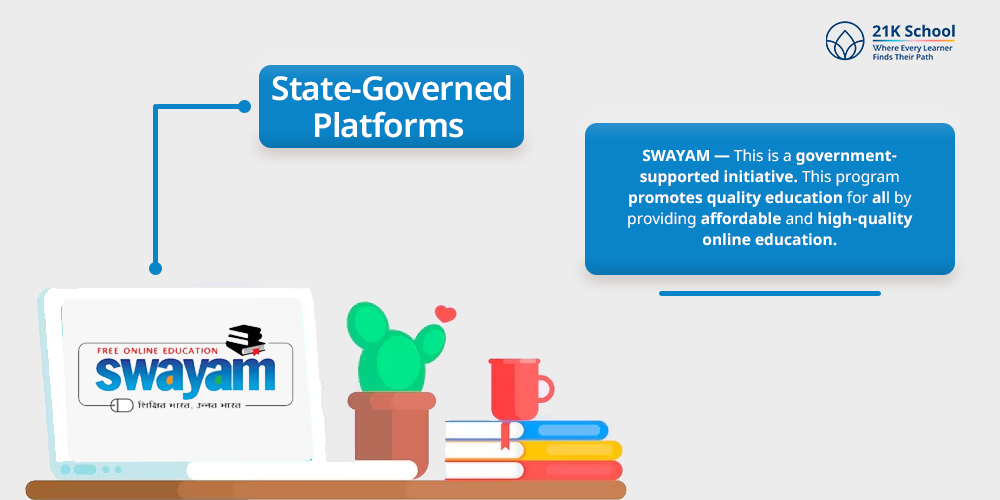
SWAYAM — This is a government-supported initiative.
This program promotes quality education for all by providing affordable and high-quality online education.
The platform is dedicated to students and professionals who are opting for higher education and skill development through certifications.
It offers high-quality content developed by top academic institutions across the country.
Pros:
- As it is a woman-supported initiative the courses offered by the platform are very affordable and accessible.
- The platform offers high-quality content developed by top academic institutions in India.
- Being a government-supported initiative it caters to diverse education in need helps students and their exam preparation and also provides support and certifications to professionals looking for enrichment and improvement.
- It aligns with Central Government standards for credibility and follows the standard education system of the country.
- The platform is ideal for students and professionals seeking cost effective skill development platform to grow.
Cons:
- The platform offers very limited interactivity and lacks real-time support for the learners.
- The courses offered by the platform have no variety and may not be as vast as the other private platforms.
- Like every other platform, it requires self-motivation and discipline to complete a course successfully as it might get time-consuming.
Benefits of Virtual Learning Platforms in India
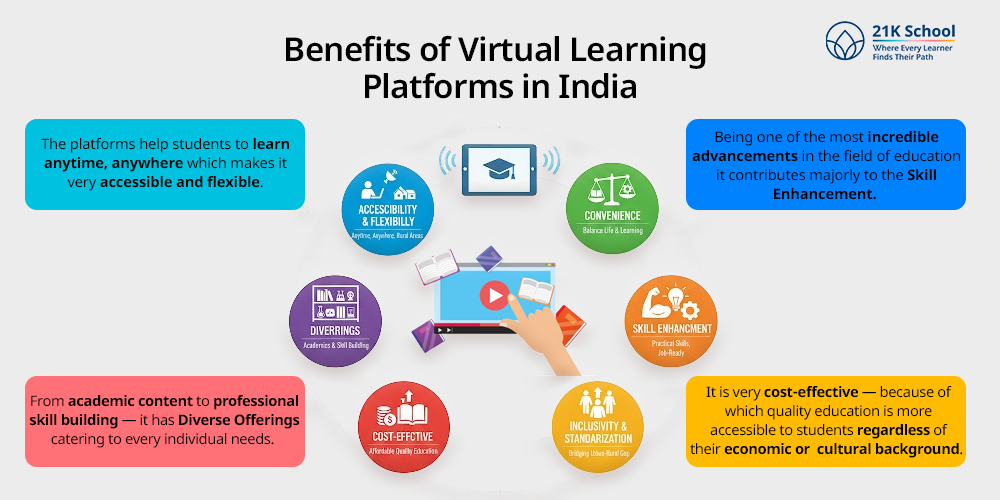
To sum up the benefits of virtual learning platforms in India it is easy to start with the features like accessibility which makes it possible for education to reach out into rural and underprivileged areas of the country, bridging the gap between the urban and the rural education system and standardising it.
The platforms help students to learn anytime, anywhere which makes it very accessible and flexible.
The virtual learning platform makes it convenient for school students, work professionals and lifelong learners to strike the balance between their overall life and their personal choice of learning beyond the traditional methods.
Virtual learning platforms have a lot to offer, from academic content to professional skill building — it has Diverse Offerings catering to every individual needs.
Being one of the most incredible advancements in the field of education it contributes majorly to the Skill Enhancement in the lives of the students, enhancing practical skills, and making learners job-ready.
It is very cost-effective — because of which quality education is more accessible to students regardless of their economic or cultural background.
Challenges and Mitigation Strategies
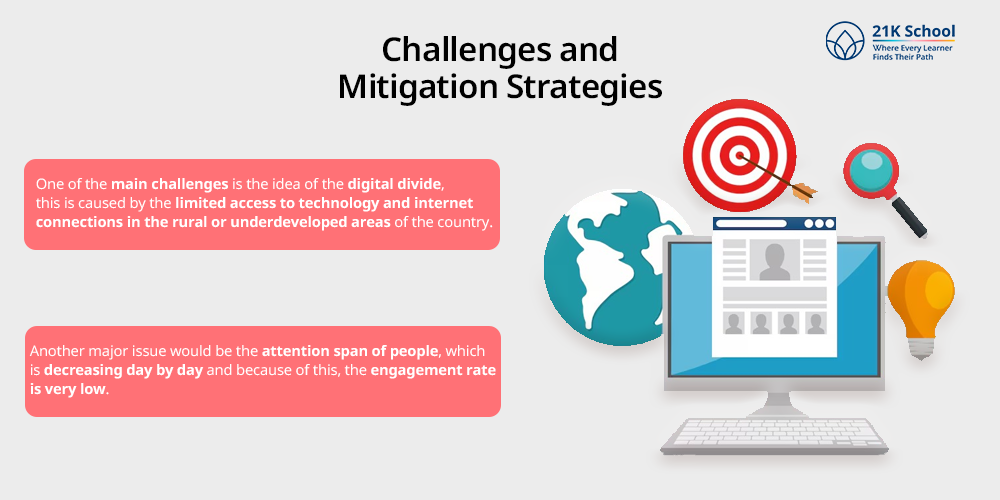
Many challenges come along with all these virtual learning platforms, now these challenges are not as important as the benefits it has to offer but, challenges persist.
One of the main challenges is the idea of the digital divide, this is caused by the limited access to technology and internet connections in the rural or underdeveloped areas of the country.
How to solve this problem; now this is one of the most significant barriers which requires government intervention to address this issue.
There are even some organisations that work along with the government to make technology more accessible and affordable for all.
Even if the resources are provided to all, another major issue would be the attention span of people, which is decreasing day by day and because of this, the engagement rate is very low.
The major cause of this is the distraction caused by the overall comfort in the learning environment, which favors the line “no pain, no gain.”
Additionally, there is a constant drawback due to the lack of physical and human interaction with the facilitator or educator.
The only solution to this problem is to introduce more interactive tools and integrate gamification into the content being offered to students.
It will also be equally important to localize the content to ensure that learning is accessible to students who are non-English speakers. In rural areas, this could be a game-changer.
Future of Virtual Learning Platforms in India
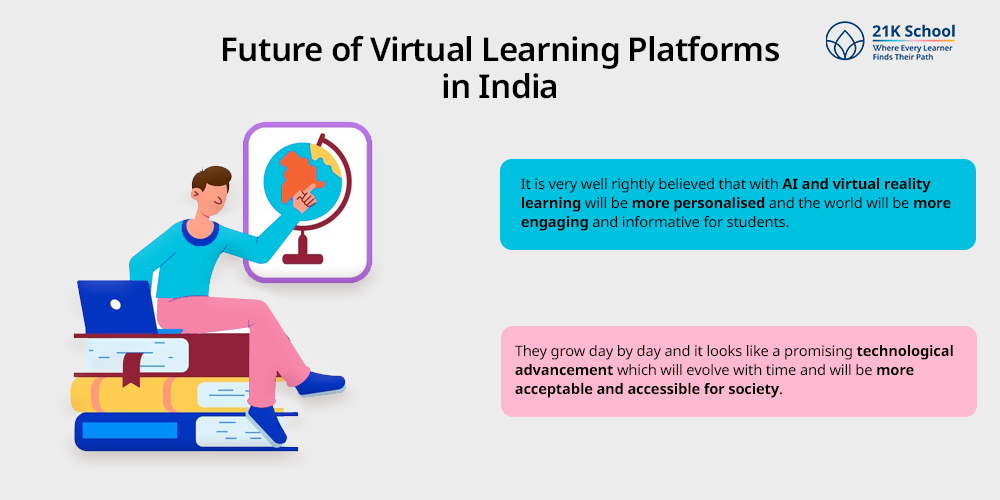
For the last few years, our country has been seeing very drastic shifts in the learning models as virtual learning platforms are introduced.
They grow day by day and it looks like a promising technological advancement which will evolve with time and will be more acceptable and accessible for society.
It is very well rightly believed that with AI and virtual reality learning will be more personalised and the world will be more engaging and informative for students making sure that they are always ahead of their time and that they are not taught in the restrictions of the curriculum.
Now that the government has started recognising the importance of online education and virtual learning platforms, the plans and rules implemented by them make education more accessible for people across all geography and demographic boundaries.
The initiative introduced by the government to make the internet more affordable and to make education more accessible is making changes in the dynamics of virtual learning platforms in India.
Conclusion
What does the future of India look like?
With virtual learning platforms, education will be revolutionised.
Now this will offer innovative solutions for academic and professional learning with platforms like; Byju’s, Coursera, and SWAYAM.
This makes education accessible to diverse audiences, making it affordable for students and also ensuring that they receive high-quality educational resources.
It would not be wrong to believe that a virtual learning platform can single-handedly shape the education system for the future of the country, as it promotes skill-based education online.
It ensures that a high-quality workforce is being prepared, one that will contribute positively to society.
